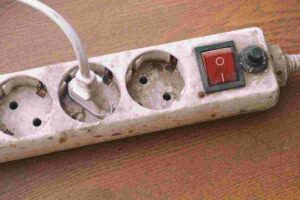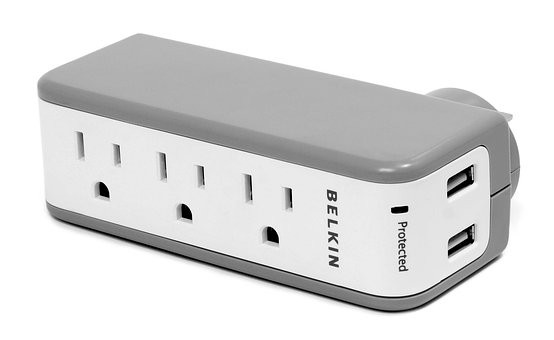Last Updated on October 24, 2023 by Kevin Chen
Image source Techpenny
A surge protector is an important device in any domestic and commercial wiring system. The main function of these protective devices is to protect the circuit and connected devices from the dangers associated with current surges. They must always at perfect operation state so that they can execute their functions effectively.
But the big question is, do surge protectors go bad?
Yes, just like most electronic components and devices, surge protectors can get damaged or just be fault.
There are numerous factors that can make these protectors to go bad.
The most common cause is wear and tear. The multiple fluctuation of power can cause key components of the surge protector to suffer constant wear and tear.
These components then lose their ability to function as required; they will offer minimum protection to the circuit.
Read on as we dig deep into the issue of faulty surge protectors and what ypu should do in case it goes bad.
Wear and tear of the surge protectors
As we have mentioned, the first culprit of a faulty surge protector is the wear and tear. Some components of the surge protector such as metal oxide varistor (MOV) will easily degrade when subjected to constant movement due to the power surges.
A surge tends to generate mechanical force which will be absorbed by the surge protector. This force will then cause some form of wear and tear on the MOV of the surge protector.
A number of internal components of the surge protector may also end up getting damaged due to such movements.
Joule rating of the surge protectors
Since the damage on the surge protector is due to the mechanical force subjected to it, these devices are built to withstand a certain amount of energy. Beyond that they will be damaged.
That rating is known as the joule rating of the surge protector. It defines the energy absorption capacity of the surge protector and indicates the amount of energy that the protector can absorb before breaking down.
High joule rating means that the surge protector will absorb high intensity of energy before failing.
So, one of the technical specifications that you should look at when buying a surge protector is its joule rating.
Take note that the joule rating should match with the application area of the surge protector. For example, very high joule rating may not be appropriate for a low-power application.
How many joules are left on my surge protector?
In the course of its operation, a surge protector will keep spending its energy. And once the energy levels are extremely low, the protector may succumb to the external forces and get damaged.
Sadly, there is no specific way of determining the amount of joules that are remaining in the surge protector. This is because it is difficult to know the amount of energy that the protector absorbs during its action-reaction phase.
Some surge protector manufacturers have even gone ahead to install LED light systems on their protection devices with the goal of warning potential buyers. However, this method may still not be accurate.
To be on the safe side, always consider doing a timely replacement in case you suspect that your surge protector is not functioning perfectly.
What happens when a surge protector goes bad?
Image of surge protector source Pixabay
When a surge protector gets, damaged, it means that your circuit and devices will no longer be safe and secured as they have been. They will be at risk of being damaged by incidences of overcurrent or surges.
Let’s say you have your television connected to the circuit, it will blow up in case of a surge and the protector has lost its power to offer the required protection.
Probably you are thinking that there will be some events the moment that a surge protector goes bad.
Actually, nothing dramatic will happen. The surge protector will still continue operating as usual only that it will lack its protective role.
Only those surge protectors that have LED will start illuminating in case of a damage.
However, in case of an extreme physical damage, there are numerous physical events that you are likely to witness.
One of them is circuit failure whereby the device connected to the circuit will not get power. A spark or a burning smell may also be another indication of a damaged surge protector.
In case you experience any of the above signs, you should consider replacing your surge protector immediately. This will be for safety reason and to prevent damage on your electrical devices.
How long do surge protectors last?
It is advisable to confirm the lifespan of a surge protector when buying. This will help make early arrangements in case it gets damaged.
The lifespan of most surge protectors is between 3-5 years. It all depends on the usage and the rated joules.
Once that period has elapsed, you should consider replacing it with a new surge protector.
How can I test a surge protector?
Given that the nature of damage on surge protector is not electrical, there is no way of testing these protection devices. This is compounded by the fact that there are not tools for doing this job.
The best that you can do is to manually asses the MOV and determine the extent of wear and tear.
A qualified electrician may also help you with this critical assessment and give you relevant advice.
Conclusion
Now you have the right answer: surge protectors do go bad. They also tend to lose their effectiveness over time even when they seem to be physically good.
When you discover that your surge protector is faulty, you should initiate the process of getting a replacement.
The new surge protector should come from a reliable and reputable manufacturer or supplier. This is because low-quality surge protector will still fail you.
And this is where ICRFQ comes in. We are a reputable surge protector supplier in China.
We source our surge protectors from the best brands in China. All you need is to contact us and we will be able to supply.
If you want to find more Electronic Components Distributors, please check out the following articles:
Electronic Components Distributors In the USA
Electronic Components Distributors In UK
Electronic Components Distributors In China
Electronic Components Distributors In India
Electronic Components Distributors In Singapore
Electronic Components Distributors In Malaysia
Electronic Components Distributors In Vietnam
Electronic Components Distributors In South Korea
- The Ultimate Guide to IRFZ44N MOSFET - April 30, 2024
- AMD Ryzen 5 vs Intel i5: How to Choose the Right Processor? - April 30, 2024
- Where to buy IC chips? The Best Guide? - March 26, 2024






